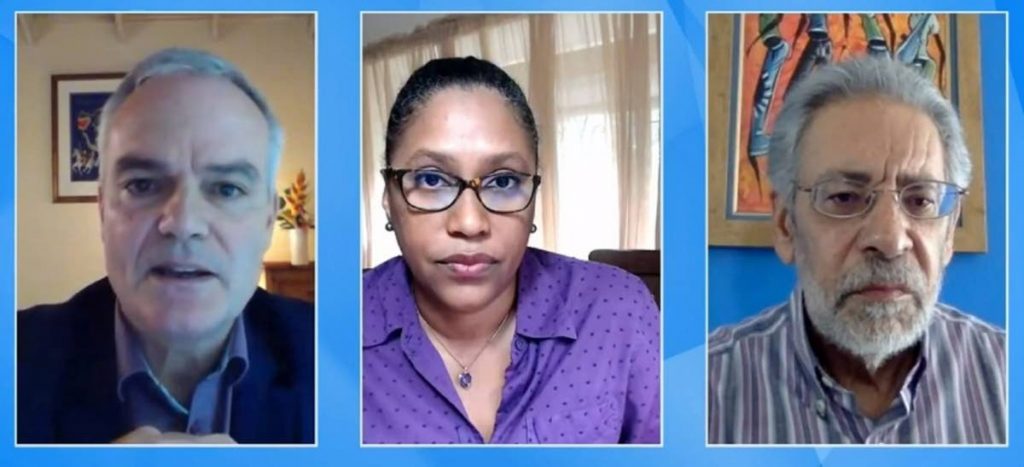Vaccines cutting covid19 numbers worldwide

Epidemiologist Dr Peter Figueroa, chair of the PAHO Regional Immunization Technical Advisory Group said since the rollout of the covid19 vaccine, there has been a 40 per cent decrease in the number of cases, a 30 per cent reduction in hospitalisation due to the virus and a 16 per cent reduction in covid19-related deaths.
He made the statement during UWI’s covid19 vaccination question-and-answer session on Monday.
He said all three vaccines currently in widest circulation – Pfizer, Moderna, and AstraZeneca – were safe for use. While there was a risk of anaphylaxis (shock due to an extreme allergic reaction) with the Pfizer (four in every million vaccinations) and Moderna (two in every million vaccinations), no such effects had been seen with the AstraZeneca drug.
“This is why wherever the vaccine is being given, you ensure you have adrenaline and diphenhydramine (DPH) injections, whichever is equivalent, so that if anyone has an allergic reaction so it can be addressed immediately.
"People who have regular food allergies can take this vaccine.
But, he said, "If you’ve had an anaphylactic reaction to another vaccine before this, you’re advised to take another vaccine.”
He said side effects of the vaccines so far were injection site swelling and tenderness, fever, headache, tiredness, all of which last under a day, and show that the immune system is responding to the vaccine.
Moderator Prof Clive Landis addressed some of the controversies surrounding the vaccine. He said the French Prime Ministers had said the AstraZeneca vaccine was quasi-ineffective on people over 65 because European countries could not access the number of doses they wanted. While politicians were downplaying the vaccine,he said, the scientific body which regulates the approvals of all medicines in Europe issued approvals for their use in people of all ages.
He said in the UK, there had been a 94 per cent drop in hospitalisation of those using the vaccine.
The AstraZeneca vaccine being used in the Caribbean, he explained, came from the Serum Institute of India (SII), and was a gift to the government of Barbados from the government of India.
“India makes more vaccines than anywhere in the world, and the SII is their leading bio-technology company and it produces the most vaccines in India. So not only does it have accreditation from the WHO, but the WHO has specifically said the covid19 vaccine made in SII has received its approval for safety, and the Caribbean Public Health Agency always goes with the WHO’s approval.”
Geneticist Prof Christine Carrington addressed misinformation surrounding the mechanisms by which the virus works. She said the spike protein carried on the mRNA virus used in the vaccine would not be able to enter the heart muscles.
“When you get the mRNA vaccine, the molecule is very localised. It’s delivered to the cells in the region where the injection occurs and then those cells begin to make the spike protein that prompts the immune response that will protect you. The mRNA doesn’t replicate or spread and is destroyed soon after after it’s used to make that protein.
"So it’s localised and will not enter your heart muscles.”
In response to a question, she also said the spike protein did not contain part of the HIV genome.
She said mRNA vaccines cannot enter DNA and modify it permanently, another piece of misinformation which is being spread.
“The mRNA does not enter the DNA. Your DNA is in a part of the cell called the nucleus and that mRNA does not enter the nucleus of the cell – and even if it did, you need special enzymes that would integrate it into your DNA and that is not present, so that will not occur. It stays outside of the nucleus, in the cytoplasm, and when it’s there it’s used to make the spike proteins that will elicit the immune response.
"RNA is easily degraded and breaks down quite quickly once it’s in the cells. That’s why the vaccine has to remain at such low temperatures, as mRNA is easily destroyed.”
Figueroa said people who are immunocompromised should discuss with their doctors whether the vaccine will help or hinder their immune response and to assess the risk benefit to them personally.
The full Q&A session can be found on UWITV’s Facebook page.

Comments
"Vaccines cutting covid19 numbers worldwide"